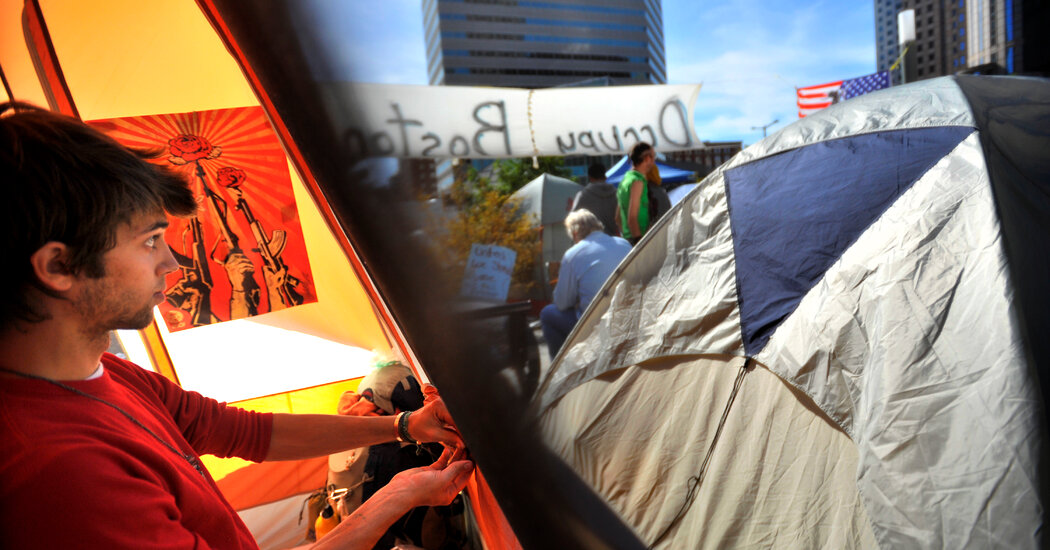
Prominent movements like Occupy Wall Street and Black Lives Matter have had an impact. But none achieved their ambitions.
Three progressive movements have risen to prominence over the past 15 years and vowed to create a fairer America: Occupy Wall Street, #MeToo and Black Lives Matter.
All of them have had an impact. Occupy popularized the idea of the 1 percent and the 99 percent. #MeToo led to the firing (and sometimes jailing) of sexual predators, as well as the hiring of more women in prominent jobs. Black Lives Matter led to policing reforms in some cities and the hiring of more Black Americans in prominent jobs.
Still, none of the three movements have come close to achieving their ambitions.
Congress has not passed any major laws to reduce economic, gender or racial inequality, such as a wealth tax, universal pre-K or nationwide police reforms. Instead, taxes on the affluent are near their lowest level in decades, and the number of killings by the police remains largely unchanged. “The term ‘reckoning’ was invoked again and again, and yet we don’t seem to have reckoned with any of our problems in any meaningful way,” Fredrik deBoer, a popular Substack newsletter writer, argues in a new book.
What explains these disappointments? In part, it’s simply that political change is fantastically difficult and often takes decades. But the degree of difficulty is only part of the story.
The movements also bear some responsibility for their disappointments. Above all, they made decisions geared more toward changing elite segments of American society — like academia, Hollywood and the national media — than toward passing new laws and changing most people’s lives.
That’s the central argument of deBoer’s book, “How Elites Ate the Social Justice Movement.” It has helped me think about American politics, and I want to devote today’s newsletter to these issues.
Radical and practical
The most successful political movements tend to share a few features. They start with activists whose goals can seem so audacious as to be unrealistic. (Otherwise, there would be no need for a movement.) Over time, the movement’s leaders make careful decisions about how to accomplish at least some of those goals. They appeal to public opinion. They collaborate with unlikely allies. They work the system to change the system.
It was true of the civil rights movement, which combined radical aims with patriotic symbols and nonviolent protest. More recently, the gay rights movement accomplished rapid change partly by emphasizing traditional values like marriage and military service. The lessons also apply to the political right: Abortion opponents spent decades patiently taking over the Republican Party and making the case that voters have a right to choose their own policies, state by state.
Recent progressive movements have tended to be less strategic, explains deBoer, a self-described leftist. Occupy celebrated its lack of structure, including its lack of concrete goals. “Demands are disempowering since they require someone else to respond,” one Occupy protester told The New York Times in 2011. Black Lives Matter refused to name leaders, contrasting its approach with the old top-down civil rights movement. #MeToo, befitting its hashtag, never quite became an organized movement.
None of the three created a mass organization with a long-term plan — as labor unions, civil rights groups, evangelical Christians and other successful movements did in past decades.
Occupy and Black Lives Matter also allowed unpopular positions to shape their public image — and weaken them. For instance, polling shows that most Black Americans support major changes to policing but not less policing. Much of Black Lives Matter, however, focused on cutting police funding. One organizer wrote a Times Opinion article titled “Yes, We Mean Literally Abolish the Police.”
The recent movements have instead had more success changing elite institutions that tend to be filled by fellow liberals. The winners of prestigious cultural awards have become more diverse. Media organizations now capitalize Black when describing somebody’s race. President Biden has made Juneteenth a federal holiday. Universities emphasize identity in their curriculums.
Symbols over substance
These are real changes, but deBoer notes that they have little effect on most people’s lives. They instead reflect what the political philosopher Olúfẹ́mi Táíwò calls the “elite capture” of social justice campaigns. “Today,” deBoer writes, “left-activist spaces are dominated by the college-educated, many of whom grew up in affluence and have never worked a day at a physically or emotionally demanding job.” For that reason, these spaces prioritize “the immaterial and symbolic” over “the material and the concrete,” deBoer argues.
(That point is related to a continuing theme of this newsletter: the class inversion of American politics.)
DeBoer’s writing can be withering, as the best polemics often are, and few people will agree with all of his arguments. But his central point is important, whether you’re part of the political left, center or right: Calling out injustice isn’t the same as fighting it.
“The spirit of 2020 was always a righteous spirit, and the people and organizations that powered that moment had legitimate grievances and moral demands,” he writes. “What we need is practicality, resilience and a plan.”
For more
-
“Does the conversation around social justice, especially in the media and academia, actually serve the less fortunate and the oppressed?” Jay Caspian Kang asked in a Times Opinion Q. and A. with Táíwò last year.
-
Pamela Paul, a Times columnist, wrote that she hoped deBoer’s book would be read “especially by those on the left.”
THE LATEST NEWS
Politics
-
Biden will join striking autoworkers on the picket line in Detroit today, an unusual show of support for unions by a U.S. president.
-
More military aid for Ukraine is a sticking point in Senate talks to avoid a government shutdown. Read what services, like national parks and food aid, a shutdown would affect.
-
Senator Robert Menendez, a New Jersey Democrat facing corruption charges, denied wrongdoing and said he would not resign. Some Democrats said he should.
-
Seven Republican presidential candidates have qualified for tomorrow night’s primary debate. Donald Trump, the front-runner, does not plan to attend.
-
Fox News will host a November debate between Ron DeSantis and Gavin Newsom, the Democratic governor of California. The two often criticize each other.
War in Ukraine
-
Ukraine said it killed the commander of Russia’s Black Sea Fleet in a missile strike on Crimea. The claim could not be verified.
-
Russia struck one of the main ports that Ukraine uses to ship grain, hitting warehouses and dozens of trucks.
-
Vladimir Putin is trying to maintain military control of the Black Sea. See photos of life in one Ukrainian port city.
Hollywood Strikes
-
The striking actors’ union is studying the deal studios struck with writers to inform their bargaining strategy.
-
The studios and the actors’ union have not spoken in more than two months. No talks are scheduled.
-
Members of the actors’ union voted to authorize a strike against 10 major video game companies, Variety reports.
China
-
Biden hosted Pacific Island leaders at the White House. The U.S. is competing with China for influence in the region.
-
The Philippine Coast Guard removed Chinese barriers that blocked Filipino fishing boats in the South China Sea, a direct challenge to Beijing.
Climate
-
Giant new oil and gas wells are threatening aquifers that supply drinking water.
-
Use of coal and oil could peak this decade as cleaner energy technologies spread, according to the International Energy Agency.
-
American companies are investing in solar panel production, entering an industry dominated by China.
-
Scientists in California briefly reproduced the process of fusion that powers the sun, repeating an experiment from last year but generating much more energy.
Other Big Stories
-
A fuel depot exploded in Azerbaijan’s breakaway Nagorno-Karabakh region, killing at least 20 people. Armenian refugees trying to evacuate were in line for gas.
-
A third person was charged in the death of a 1-year-old boy at a Bronx day care.
Opinions
The government can stem the rapid rise in child poverty by reviving pandemic relief programs — especially the expanded child tax credit, Nikhil Goyal writes.
A proposed mine in Alaska would destroy the world’s largest salmon fishery. Congress should step in and save the waters, Carl Safina and Joel Reynolds write.
Here’s a column by Michelle Goldberg on a failing antiracism center.
MORNING READS
‘We will lose our identity’: Goro, Italy, is famous for its clams, but an invasion of blue crabs is threatening its spaghetti alle vongole.
Bulletproof backpacks: A mother who survived a school shooting herself struggles to send her children back to class each fall.
Midlife crisis: Mammals first appeared on earth about 250 million years ago. Scientists say we have another 250 million years ahead of us.
Amicable and mutual: Celebrities say they are fine with their breakups. Are they being honest?
Lives Lived: David McCallum was a Scottish-born actor who played a Russian spy on “The Man From U.N.C.L.E.” in the 1960s and found fame again almost 40 years later on the hit series “N.C.I.S.” He died at 90.
SPORTS
N.F.L.: The Cincinnati Bengals survived a gritty matchup against the Los Angeles Rams, winning 19-16. The Philadelphia Eagles pummeled the upstart Tampa Bay Buccaneers, 25-11.
Jets: The former quarterback Joe Namath had harsh words for the Jets’ starter: “I’ve seen enough of Zach Wilson.”
ARTS AND IDEAS
Fashion month: The designer Sabato De Sarno was essentially unknown outside the fashion industry until Gucci made him the new creative director of its $10 billion empire. But his debut show had Milan Fashion Week’s glitziest front row: Julia Roberts, Ryan Gosling and Jessica Chastain were all in attendance.
His subtle collection set a new tone for the brand. “Gucci has been a lot of things, but it has never been minimal. Perhaps it’s time,” Vanessa Friedman writes.
More on culture
-
“Her most promising and encouraging album yet”: Read our critic’s take on the rapper Doja Cat’s latest music.
THE MORNING RECOMMENDS …
Dry-roast wings, then add harissa.
Buy a firmer mattress if you sleep on your stomach.
Cuddle up on the couch with one of these throw blankets.
GAMES
Here is today’s Spelling Bee. Yesterday’s pangram was toughen.
And here are today’s Mini Crossword, Wordle, Sudoku and Connections.
Thanks for spending part of your morning with The Times. See you tomorrow. — David
P.S. Ford Motor Company permanently adopted a five-day, 40-hour workweek 97 years ago.
Sign up here to get this newsletter in your inbox. Reach our team at themorning@nytimes.com.








